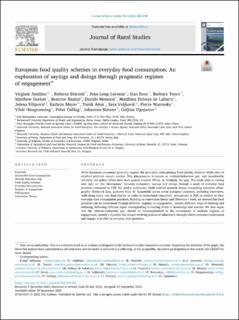| dc.contributor.author | Amilien, Virginie | |
| dc.contributor.author | Discetti, Roberta | |
| dc.contributor.author | Lecoeur, Jean-Loup | |
| dc.contributor.author | Roos, Gun | |
| dc.contributor.author | Tocco, Barbara | |
| dc.contributor.author | Gorton, Matthew | |
| dc.contributor.author | Biasini, Beatrice | |
| dc.contributor.author | Menozzi, Davide | |
| dc.contributor.author | Duboys de Labarre, Matthieu | |
| dc.contributor.author | Filipović, Jelena | |
| dc.contributor.author | Meyer, Kathrin Barbara | |
| dc.contributor.author | Török, Áron | |
| dc.contributor.author | Veljković, Saša | |
| dc.contributor.author | Wavresky, Pierre | |
| dc.contributor.author | Haugrønning, Vilde | |
| dc.contributor.author | Csillag, Péter | |
| dc.contributor.author | Simons, Johannes | |
| dc.contributor.author | Ognjanov, Galjina | |
| dc.date.accessioned | 2023-02-20T12:29:26Z | |
| dc.date.available | 2023-02-20T12:29:26Z | |
| dc.date.created | 2022-11-10T11:46:34Z | |
| dc.date.issued | 2022-09-29 | |
| dc.identifier.citation | Journal of Rural Studies. 2022, 95 336-349. | en_US |
| dc.identifier.issn | 0743-0167 | |
| dc.identifier.issn | 1873-1392 | |
| dc.identifier.uri | https://hdl.handle.net/11250/3052357 | |
| dc.description.abstract | While European consumers generally support the principles underpinning Food Quality Schemes (FQS) sales of certified products remain modest. This phenomenon is known as ‘attitude-behaviour gap’ and considerable scholarly and policy efforts have been geared towards ‘filling’ or ‘bridging’ the gap. This study aims at casting new light on this ‘discrepancy’ between consumers’ sayings and doings through a study of everyday food practices connected to FQS. We used a qualitative, multi-method research design comprising extensive ethnographic fieldwork data, gathered from 41 households across seven European countries, including interviews, walk-along tours, and food diaries, in order to understand consumers’ perceptions of FQS in relation to their everyday food consumption practices. Building on convention theory and Th´evenot’s work, we showed that food practices can be understood through different ‘regimes of engagement’, namely different ways of thinking and behaving, following different logics corresponding to varying levels of knowledge and interest. We thus argue that the ‘attitude-behaviour gap’ should be reconceptualised as the co-existence of multiple regimes of engagement, namely a dynamic and always evolving process of adjustment through which consumers understand and engage with FQS in everyday food practices. | en_US |
| dc.language.iso | eng | en_US |
| dc.publisher | 0743-0167 | en_US |
| dc.relation.ispartofseries | Journal of Rural Studies;Volume 95 | |
| dc.rights | Navngivelse 4.0 Internasjonal | * |
| dc.rights.uri | http://creativecommons.org/licenses/by/4.0/deed.no | * |
| dc.subject | Food handling practices | en_US |
| dc.subject | Food handling practices | en_US |
| dc.subject | Food Supply Chain | en_US |
| dc.subject | Food Supply Chain | en_US |
| dc.subject | Forbruk mat | en_US |
| dc.subject | Food consumption | en_US |
| dc.title | European food quality schemes in everyday food consumption: An exploration of sayings and doings through pragmatic regimes of engagement | en_US |
| dc.type | Peer reviewed | en_US |
| dc.type | Journal article | en_US |
| dc.description.version | publishedVersion | en_US |
| dc.rights.holder | © 2022 The Authors | en_US |
| cristin.ispublished | true | |
| cristin.fulltext | original | |
| cristin.qualitycode | 2 | |
| dc.identifier.doi | https://doi.org/10.1016/j.jrurstud.2022.09.009 | |
| dc.identifier.cristin | 2071742 | |
| dc.source.journal | Journal of Rural Studies | en_US |
| dc.source.volume | 95 | en_US |
| dc.source.issue | 95 | en_US |
| dc.source.pagenumber | 336-349 | en_US |
| dc.relation.project | EC/H2020/No 678024 | en_US |
| dc.relation.project | EC/H2020/678024 | en_US |
| dc.subject.nsi | VDP::Annen kulturvitenskap: 069 | en_US |
| dc.subject.nsi | VDP::Other subjects within cultural studies: 069 | en_US |
| dc.subject.nsi | VDP::Annen kulturvitenskap: 069 | en_US |
| dc.subject.nsi | VDP::Other subjects within cultural studies: 069 | en_US |
| dc.subject.nsi | VDP::Annen kulturvitenskap: 069 | en_US |
| dc.subject.nsi | VDP::Other subjects within cultural studies: 069 | en_US |

